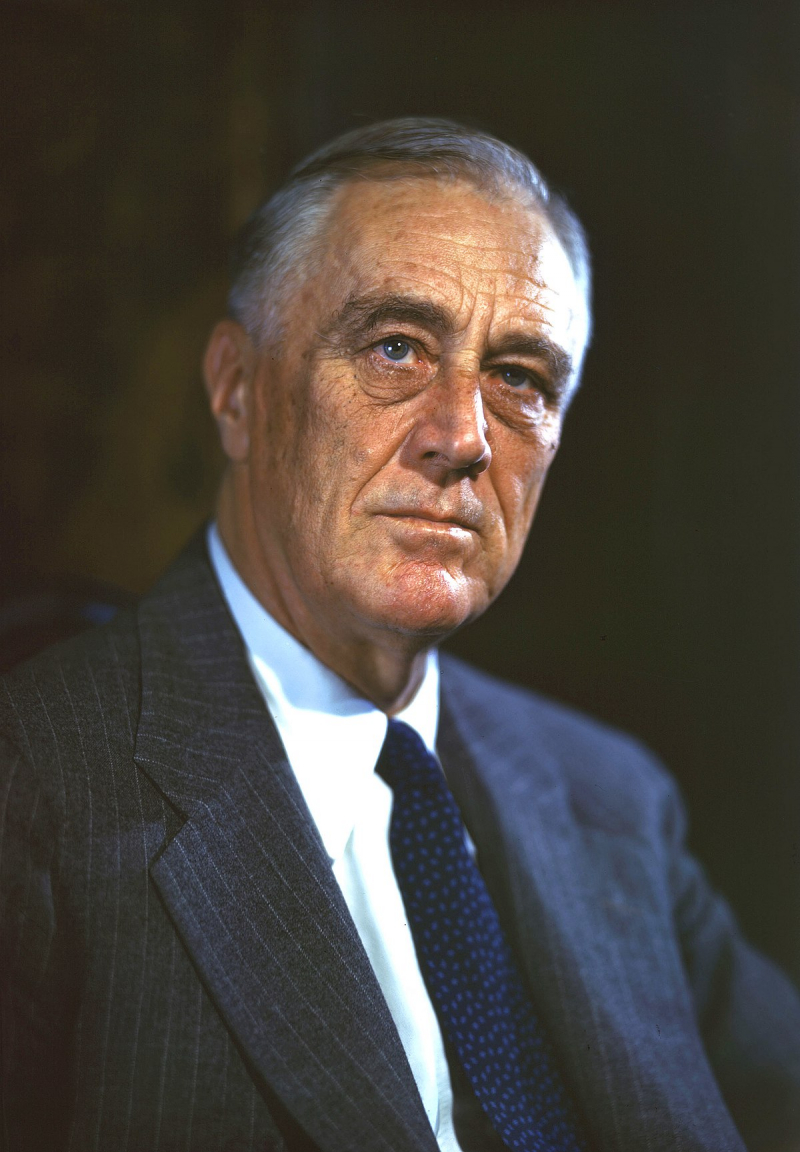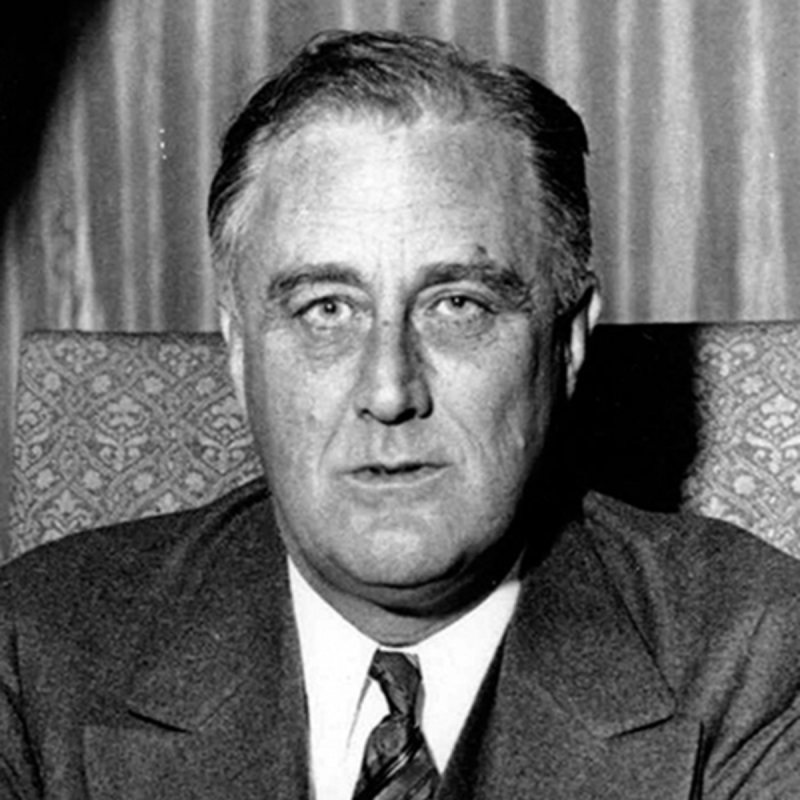Franklin D. Roosevelt
Franklin Delano Roosevelt (January 30, 1882 - April 12, 1945) was the President of the United States from 1933 to 1945, was an American politician and lawyer who served as the 32nd President of the United States from 1933 until his death in 1945. He won four presidential elections as a member of the Democratic Party and became a central figure in world events during the first half of the twentieth century. During the majority of the Great Depression, Roosevelt led the federal government, implementing his New Deal domestic agenda in response to the worst economic crisis in American history. As the dominant leader of his party, he established the New Deal Coalition, which defined modern liberalism in the United States for the next three decades. World War II dominated his third and fourth terms, which ended shortly after he died in office.
Born in Hyde Park, New York, to the prominent Roosevelt family, he graduated from both Groton School and Harvard College, as well as Columbia Law School, which he left after passing the bar exam to practice law in New York City. Eleanor Roosevelt, his fifth cousin once removed, married him in 1905. They had six children, five of whom lived to adulthood. In 1910, he was elected to the New York State Senate, and during World War I, he served as Assistant Secretary of the Navy under President Woodrow Wilson. On the Democratic Party's national ticket in 1920, Roosevelt was James M. Cox's running mate, but Cox was defeated by Republican Warren G. Harding. Roosevelt contracted a paralytic illness, thought to be polio at the time, in 1921, and his legs became permanently paralyzed. Roosevelt established a polio rehabilitation center in Warm Springs, Georgia, while attempting to recover from his condition. Roosevelt returned to public life after being elected governor of New York in 1928, despite his inability to walk unaided. He served as governor from 1929 to 1933, promoting programs to combat the United States' economic crisis.
Roosevelt defeated Republican incumbent Herbert Hoover in the 1932 presidential election and took office in the midst of the Great Depression. He oversaw unprecedented federal legislative productivity during the first 100 days of the 73rd United States Congress. Roosevelt advocated for the establishment of programs aimed at providing relief, recovery, and reform. Within his first year in office, he began enacting these policies through a series of executive orders and federal legislation known as the New Deal. Many New Deal programs, such as the National Recovery Administration, provided assistance to the unemployed. Farmers were helped by several New Deal programs and federal laws, such as the Agricultural Adjustment Act. Roosevelt also implemented significant regulatory reforms in finance, communications, and labor. In addition to the economy, Roosevelt sought a compromise on Prohibition with the Democratic Party's urban and rural wings. Roosevelt implemented the Beer Permit Act of 1933 and enforced the 21st amendment after campaigning on a platform to repeal it. As part of the New Deal, alcohol tax revenue would be used to fund public works projects. Roosevelt frequently used radio to address the American people directly, delivering 30 "fireside chat" radio addresses during his presidency and becoming the first American president to be televised. During Roosevelt's first term, the economy improved rapidly, and he was re-elected in 1936 with one of the most lopsided victories in American history.
Despite Roosevelt supporters' enthusiasm for the New Deal, from 1936 onwards, New Deal legislation was frequently overturned by the US Supreme Court, which maintained a conservative bias. Because of the disagreement between Roosevelt and the Court, Roosevelt advocated for the Judicial Procedures Reform Bill of 1937 (or "court packing plan"), which would have increased the size of the Supreme Court. The newly formed bipartisan Conservative Coalition, which also sought to prevent further New Deal legislation, blocked the bill. During the 1937-1938 recession, Roosevelt launched a rhetorical campaign in the United States against big business and monopoly power. The Securities and Exchange Commission, the National Labor Relations Act, the Federal Deposit Insurance Corporation, Social Security, and the Fair Labor Standards Act were also major 1930s legislation and agencies established by Roosevelt.
Roosevelt was re-elected for a third term in 1940, making him the only president of the United States to serve for more than two terms. By 1939, another World War was looming, prompting the United States to respond by enacting a slew of laws affirming neutrality and opposing intervention. Despite this, President Roosevelt provided China, the United Kingdom, and, eventually, the Soviet Union with strong diplomatic and financial support. Roosevelt obtained a congressional declaration of war against Japan following the Japanese attack on Pearl Harbor on December 7, 1941, which he described as "a date that will live in infamy." Japan's allies, Nazi Germany and Fascist Italy, declared war on the United States on December 11, 1941. As a result, the United States formally joined the Allies and entered the European theater of war. With the help of his top aide Harry Hopkins and widespread national support, he led the Allied Powers against the Axis Powers alongside British Prime Minister Winston Churchill, Soviet General Secretary Joseph Stalin, and Chinese Generalissimo Chiang Kai-shek. Roosevelt oversaw the mobilization of the American economy to support the war effort and implemented a Europe-first strategy, launching the Lend-Lease program and prioritizing the defeat of Germany over that of Japan. His administration oversaw the building of The Pentagon, spearheaded the development of the world's first atomic bomb, and collaborated with other Allied leaders to lay the groundwork for the United Nations and other postwar institutions. During his wartime leadership, the United States rose to global superpower status.
In the 1944 presidential election, Roosevelt was re-elected on a post-war recovery platform. His physical health began to deteriorate during the later war years, and he died on April 12, 1945, less than three months into his fourth term. Vice President Harry S. Truman assumed the presidency and oversaw the Axis powers' acceptance of surrender. Several of Roosevelt's actions have been heavily criticized since his death, including the relocation and internment of Japanese Americans in concentration camps. Nonetheless, scholars, political scientists, and historians consistently rank him as one of the greatest presidents in American history.












